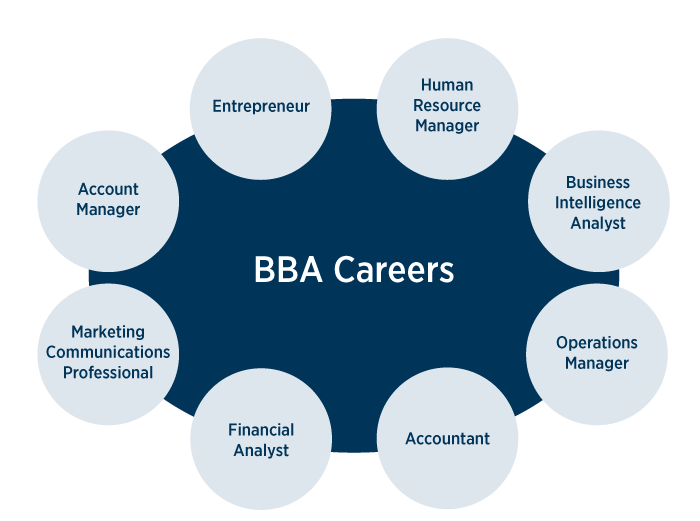
A business administration bachelor degree equips you with the essential skills and knowledge to thrive in today’s dynamic business world. This comprehensive program provides a strong foundation in core business principles, including finance, marketing, management, and accounting, preparing you for a wide range of rewarding career paths.
From understanding financial statements to developing effective marketing strategies, you’ll gain the practical skills needed to analyze complex business challenges, make informed decisions, and lead with confidence. The curriculum typically includes a blend of theoretical coursework and hands-on experiences, ensuring you’re well-prepared to navigate the complexities of the modern business landscape.
What is a Business Administration Bachelor’s Degree?

A Bachelor of Business Administration (BBA) degree is a popular undergraduate program that equips students with the knowledge and skills needed to succeed in various business-related roles. It offers a comprehensive understanding of business principles, practices, and theories, preparing graduates for a wide range of careers in the corporate world.
Core Concepts of Business Administration
Business administration encompasses a broad range of disciplines, focusing on the efficient and effective management of organizations. The core concepts include:
- Management: This area focuses on planning, organizing, leading, and controlling organizational resources to achieve specific goals. It involves understanding organizational structures, leadership styles, and effective communication strategies.
- Marketing: This discipline explores how to create, promote, and deliver value to customers. It covers topics such as market research, branding, advertising, pricing, and customer relationship management.
- Finance: This area focuses on managing financial resources, including budgeting, investing, and financial analysis. It involves understanding financial statements, investment strategies, and risk management principles.
- Accounting: This discipline deals with recording, classifying, and summarizing financial transactions. It involves understanding accounting principles, financial reporting, and auditing practices.
- Economics: This area provides a foundation for understanding how markets operate and how economic factors impact business decisions. It covers topics such as supply and demand, market structures, and macroeconomic trends.
Essential Skills and Knowledge Acquired
A BBA degree develops a range of essential skills and knowledge, including:
- Analytical and Problem-Solving Skills: Students learn to analyze complex business problems, identify key issues, and develop effective solutions. This involves critical thinking, data analysis, and decision-making abilities.
- Communication Skills: Effective communication is crucial in business. Students develop strong written and oral communication skills, enabling them to present ideas clearly, negotiate effectively, and build relationships with colleagues and clients.
- Teamwork and Collaboration: Businesses operate in a collaborative environment. Students learn to work effectively in teams, leveraging diverse perspectives and skills to achieve common goals.
- Leadership Skills: BBA programs often incorporate leadership development modules, equipping students with the skills to motivate, inspire, and guide others. This involves understanding different leadership styles and building effective teams.
- Technological Proficiency: Business operations increasingly rely on technology. Students gain proficiency in various software applications, data analysis tools, and digital marketing platforms.
Typical Curriculum
The curriculum for a BBA degree typically includes a combination of core courses and elective options.
Core Courses
- Principles of Management: This course introduces fundamental management concepts, including planning, organizing, leading, and controlling. It explores different organizational structures, leadership styles, and decision-making processes.
- Financial Accounting: This course covers the principles of accounting, including recording, classifying, and summarizing financial transactions. Students learn to prepare financial statements, analyze financial data, and understand accounting standards.
- Marketing Management: This course explores the principles of marketing, including market research, product development, pricing strategies, and promotion techniques. It covers topics such as branding, customer relationship management, and digital marketing.
- Economics: This course provides a foundation in microeconomics and macroeconomics, exploring how markets operate and how economic factors impact business decisions. It covers topics such as supply and demand, market structures, and macroeconomic trends.
- Statistics and Data Analysis: This course introduces students to statistical concepts and methods for analyzing data. It equips them with the skills to interpret data, identify trends, and make informed business decisions.
Elective Options
BBA programs offer a range of elective options that allow students to specialize in areas of interest. Some common elective areas include:
- Entrepreneurship: This area focuses on the principles of starting and managing a business. It covers topics such as business planning, funding, marketing, and legal considerations.
- Human Resource Management: This area explores the management of human capital within organizations. It covers topics such as recruitment, training, performance management, and employee relations.
- International Business: This area focuses on the challenges and opportunities of conducting business across borders. It covers topics such as global trade, cultural differences, and international finance.
- Information Systems: This area explores the role of technology in business operations. It covers topics such as database management, software development, and cybersecurity.
- Supply Chain Management: This area focuses on the management of the flow of goods and services from suppliers to customers. It covers topics such as inventory management, logistics, and distribution.
Choosing the Right Business Administration Program

With so many different business administration programs available, choosing the right one can feel overwhelming. To make an informed decision, it’s essential to understand the various specializations within the field and consider your career goals, learning style, and budget.
Specializations in Business Administration
Business administration programs offer a wide range of specializations, allowing you to tailor your education to your interests and career aspirations. Some common specializations include:
- Accounting: Focuses on financial reporting, auditing, and tax preparation. This specialization prepares graduates for roles such as accountants, auditors, and financial analysts.
- Finance: Covers topics like investments, banking, and risk management. Graduates with a finance specialization may pursue careers in investment banking, financial planning, or asset management.
- Marketing: Explores consumer behavior, market research, and advertising strategies. Graduates with a marketing specialization can work as marketing managers, brand strategists, or digital marketers.
- Management: Covers leadership, organizational behavior, and strategic planning. This specialization prepares graduates for roles such as managers, supervisors, and executives.
- Human Resources: Focuses on employee relations, recruitment, and talent development. Graduates with an HR specialization can work as HR managers, recruiters, or training specialists.
- Information Systems: Combines business principles with technology, focusing on data analysis, system design, and cybersecurity. Graduates with an IS specialization can work as IT managers, data analysts, or cybersecurity specialists.
Key Factors to Consider When Selecting a Program, Business administration bachelor degree
When choosing a business administration program, several factors are crucial:
- Accreditation: Ensure the program is accredited by a reputable organization, such as the AACSB (Association to Advance Collegiate Schools of Business). Accreditation indicates that the program meets high quality standards.
- Faculty: Research the program’s faculty and their experience and expertise. Look for professors with industry experience and strong academic credentials.
- Curriculum: Review the program’s curriculum and ensure it aligns with your career goals. Consider the specific courses offered, their relevance to your desired field, and the program’s overall focus.
- Career Services: Evaluate the program’s career services, including job placement rates, internship opportunities, and alumni networks. A strong career services department can provide valuable support during your job search.
- Location: Consider the program’s location and its proximity to potential employers or industries you are interested in. Networking opportunities and access to industry events are often enhanced by location.
- Cost: Compare tuition fees, living expenses, and potential scholarships or financial aid opportunities. Choose a program that fits your budget and financial constraints.
Comparing Program Types
| Program Type | Strengths | Weaknesses |
|---|---|---|
| Traditional On-Campus | Strong networking opportunities, access to faculty and resources, immersive learning environment | Limited flexibility, higher costs, may require relocation |
| Online | Flexibility and convenience, affordability, access to a wider range of programs | Lack of in-person interaction, potential for technical difficulties, may require self-discipline |
| Accelerated | Faster completion time, potentially lower overall cost, may offer specialized courses | Intense coursework, less flexibility, may require a higher level of commitment |
The Future of Business Administration
The business landscape is constantly evolving, driven by technological advancements, globalization, and changing consumer preferences. This dynamism creates both challenges and opportunities for business professionals, requiring them to adapt and embrace new skills and knowledge. A Bachelor’s degree in Business Administration provides a solid foundation for navigating this evolving environment, equipping graduates with the necessary tools to succeed in the future of business.
The Impact of Emerging Technologies
Technological advancements are reshaping every aspect of business, from operations to marketing to customer service. Artificial intelligence (AI), machine learning, blockchain, and cloud computing are transforming industries, creating new opportunities and demanding new skills.
- AI and Machine Learning: AI and machine learning are automating tasks, improving efficiency, and providing data-driven insights for decision-making. This is particularly relevant in areas like customer service, where chatbots powered by AI can handle routine inquiries, freeing up human agents to focus on more complex issues.
- Blockchain: Blockchain technology is revolutionizing supply chain management, financial transactions, and data security. It offers transparency, immutability, and traceability, enabling businesses to streamline processes and build trust.
- Cloud Computing: Cloud computing provides flexible and scalable IT infrastructure, allowing businesses to access computing power and storage on demand. This enables businesses to be more agile and responsive to changing market conditions.
The Rise of Data Analytics
Data is the new oil, and businesses are increasingly relying on data analytics to make informed decisions. Business professionals need to understand how to collect, analyze, and interpret data to identify trends, predict outcomes, and optimize operations.
- Data-Driven Decision Making: Data analytics empowers businesses to make evidence-based decisions, leading to improved efficiency, profitability, and customer satisfaction.
- Predictive Analytics: Predictive analytics uses historical data to forecast future trends and outcomes, allowing businesses to anticipate market changes and make proactive decisions.
- Data Visualization: Data visualization tools help businesses communicate complex data insights in a clear and understandable way, making it easier to identify patterns and trends.
The Importance of Soft Skills
While technical skills are essential, soft skills are increasingly valued in the business world. These skills enable professionals to work effectively with others, communicate effectively, and navigate complex situations.
- Communication: Effective communication is crucial for building relationships, collaborating with colleagues, and presenting ideas.
- Critical Thinking: Critical thinking skills are essential for problem-solving, decision-making, and adapting to changing circumstances.
- Leadership: Leadership skills are vital for inspiring and motivating teams, fostering collaboration, and driving innovation.
- Adaptability: Adaptability is crucial for thriving in a rapidly changing business environment. Professionals need to be able to learn new skills, embrace new technologies, and adjust to new challenges.
Epilogue

A business administration bachelor degree is a valuable investment in your future, opening doors to diverse career opportunities and fostering personal growth. Whether you aspire to become a successful entrepreneur, a strategic manager, or a financial analyst, this degree will provide you with the tools and knowledge to excel in your chosen field. By combining theoretical knowledge with practical application, you’ll gain a deep understanding of business principles and develop the skills needed to make a meaningful impact in the world of business.
User Queries: Business Administration Bachelor Degree
What are the admission requirements for a business administration bachelor’s degree?
Admission requirements vary depending on the university or college. Generally, you’ll need a high school diploma or equivalent, satisfactory academic performance, and may need to submit standardized test scores like the SAT or ACT. Some programs may have specific prerequisites or require an interview.
How long does it take to complete a business administration bachelor’s degree?
A traditional business administration bachelor’s degree typically takes four years of full-time study. However, accelerated programs or online options may allow you to complete the degree in a shorter timeframe.
Is a business administration degree worth it?
A business administration degree can be a valuable asset in today’s job market, providing you with the skills and knowledge to succeed in various business roles. It can open doors to diverse career paths, increase earning potential, and enhance your overall employability.





